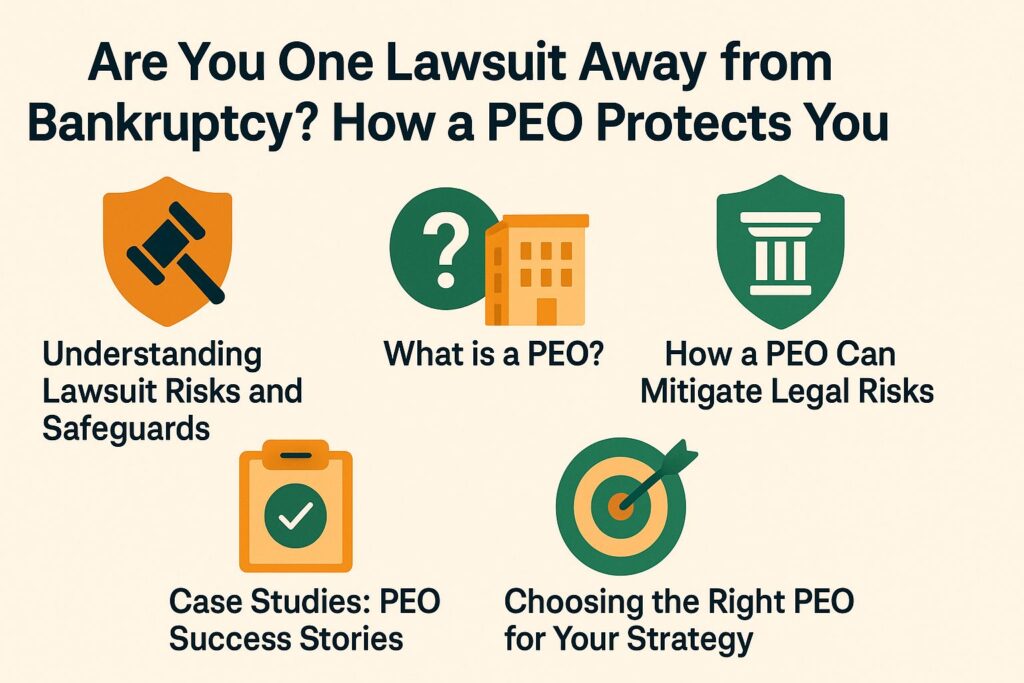
Are You One Lawsuit Away from Bankruptcy? How a PEO Protects You
One lawsuit can turn your thriving business into a financial nightmare overnight. Learn about the legal dangers and responsibilities you might face to protect your business and keep it running smoothly. Learn how a Professional Employer Organization (PEO) can protect you from expensive legal issues, help with important compliance tasks, and make managing employees easier. Stay with us to learn about the benefits of working with a PEO and find out how to pick the right one for your needs.
Knowing the Dangers of Lawsuits and Legal Protections
Businesses can encounter many legal problems that risk affecting their activities and finances, such as contract disputes, disagreements over contracts, or issues with how they handle employment matters and employee relations. Those curious about mitigating these risks might appreciate our insights on how PEOs help with workers’ compensation and compliance.
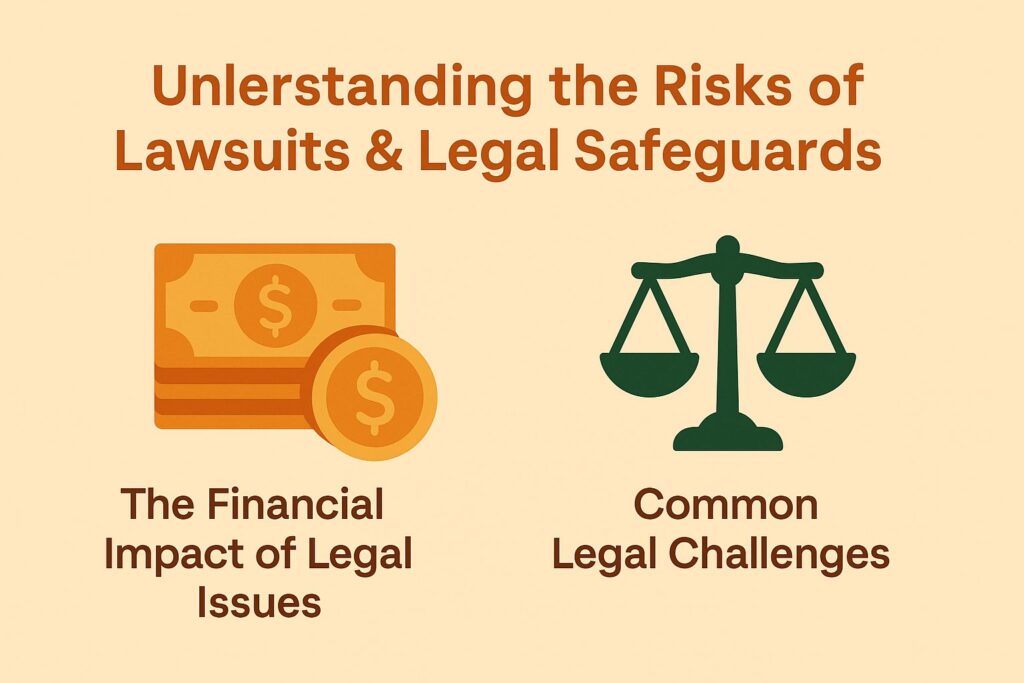
The Financial Impact of Legal Issues and Financial Obligations
Legal issues can cost small businesses upwards of $50,000 annually, affecting cash flow management, financial stability, and financial health significantly.
The costs typically break down into three main categories, impacting business expenses:
- litigation expenses, legal representation
- legal fees
- potential settlements
For example, a small business sued for breach of contract might face litigation costs exceeding $30,000, with attorney fees ranging from $150 to $500 per hour, impacting their financial planning and business strategy. This can quickly escalate, especially if the case drags on.
In extreme cases, such as a local bakery, they faced bankruptcy after spending over $80,000 on a prolonged legal battle, illustrating the potential for legal complications to threaten a business’s viability and economic downturn.
Common Legal Challenges Faced by Businesses and Risk Mitigation
Businesses frequently encounter legal challenges such as employment practices liability claims, contract disputes, regulatory compliance issues, and strategic risk management.
Other common legal pitfalls include intellectual property infringement, which can result in costly lawsuits and increased financial liabilities, and consumer protection violations, leading to significant fines.
For instance, failure to adhere to the Americans with Disabilities Act can subject companies to hefty penalties and reputational damage. A notable case is that of the retail giant Target, which faced a $18.5 million settlement due to a data breach that compromised customer information.
Overlooking these legal dangers can damage finances and reduce the trust of stakeholders, affecting brand reputation.
What is a PEO?
A Professional Employer Organization (PEO) offers a wide range of HR services, enabling businesses to hand over tasks related to managing employees and following regulations, enhancing their business protection and operational efficiency. For businesses evaluating their options, it’s worth exploring the best PEO companies that can provide tailored solutions to meet specific needs.
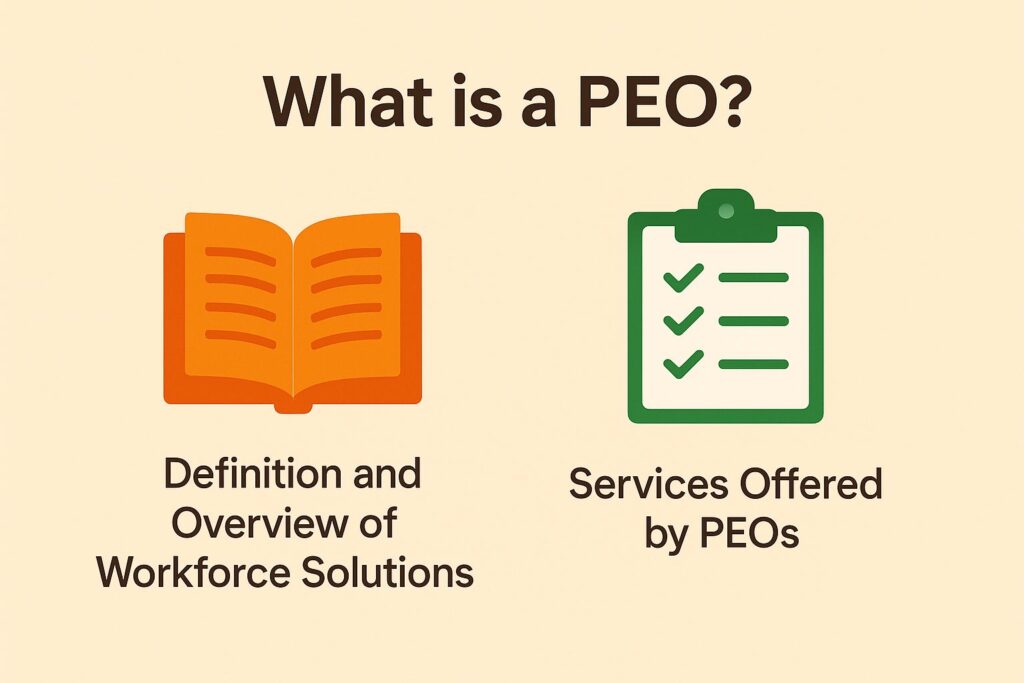
Definition and Overview of Workforce Solutions
A PEO is a company that offers businesses complete HR services, such as payroll, benefits, human resources management, and risk management.
By working with a PEO, small and medium-sized businesses can simplify their HR tasks and concentrate on growing their business. PEOs manage complex payroll systems, ensuring compliance with tax laws, which can save significant time and reduce risks.
For instance, a company experiencing rapid growth may use a PEO to handle employee benefits, allowing them to offer competitive packages without the administrative burden. PEOs offer a broader selection of employee benefits, like health insurance, liability insurance, and retirement plans, which can improve hiring and keeping staff for small and medium-sized businesses.
Services Offered by PEOs and Business Solutions
PEOs provide various services like handling payroll, managing employee benefits, ensuring tax compliance, and ensuring businesses follow legal regulations according to specific business needs.
Along with these core services, PEOs provide workforce management solutions, which can include employee training and development programs.
For example, XYZ Corp worked with a PEO to improve its onboarding process, cutting new hire training time by 30%. They also offer risk management support that helps businesses minimize workplace hazards through proactive safety training.
Companies like ABC Inc. used HR consulting services from their PEO, which helped increase employee participation, employee retention, and retention rates. By using these services, businesses can make their processes more efficient, improve adherence to rules, and create a better workplace. For an extensive analysis of this trend, our guide on the cost of PEO services examines various factors and benefits.
How a PEO Can Reduce Legal Risks and Legal Issues
PEOs help reduce legal risks by offering support for following laws and rules and by providing tools for managing employees.
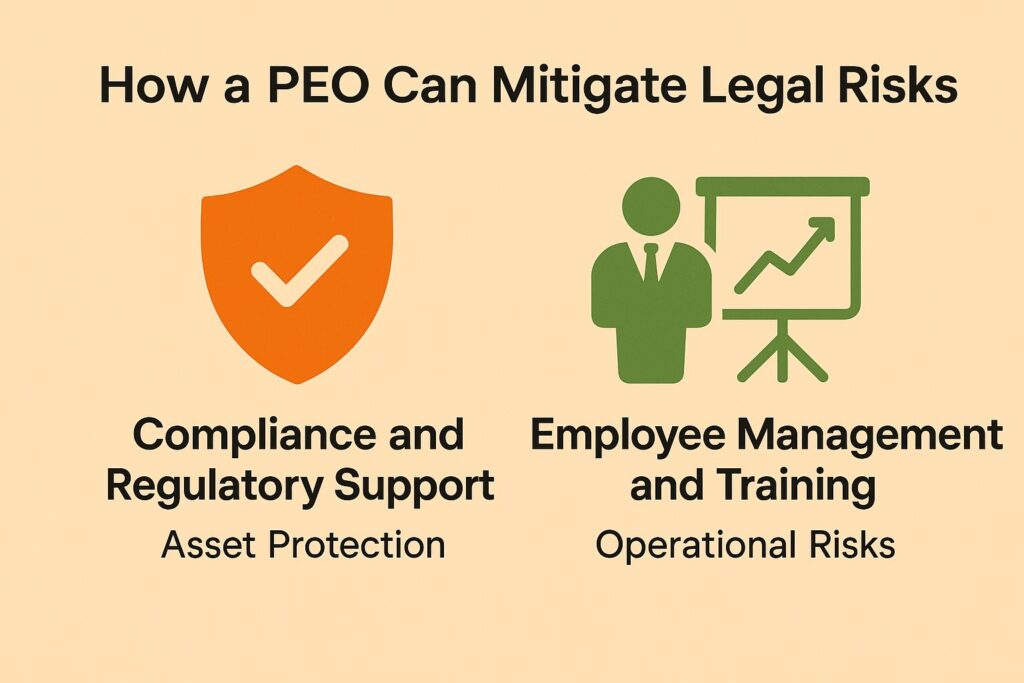
Compliance and Regulatory Support for Asset Protection
PEOs help companies manage legal issues by making sure they follow current rules like OSHA and employment laws, and they provide the needed business insurance.
A PEO can help with OSHA rules by offering safety training materials and keeping essential records, which lowers risk during inspections.
They often use HR compliance software such as Gusto or BambooHR to automatically handle updates on labor laws and maintain employee records. These tools help businesses comply with local and federal rules, reducing the risk of penalties.
A compliance officer in the PEO can provide individual support and advice suited to particular industry requirements.
Employee Management and Training for Operational Risks
PEOs improve workforce management and keep employees following workplace rules through specific training programs.
To effectively reduce legal risks and promote employee safety, PEOs implement training topics such as:
- Sexual harassment prevention
- Workplace safety protocols
- Anti-discrimination measures
For instance, a sexual harassment training session can include interactive role-playing scenarios, enhancing engagement and retention. Typically, companies that hold these training sessions see complaints drop by 30%.
Using platforms like Compliance Training Solutions makes it easier to manage programs and monitor employee progress. This approach creates an environment where following rules is important and greatly improves employee performance.
Case Studies: PEO Success Stories
A lot of companies have effectively used PEOs to handle legal issues, strengthen their legal safeguards, and make their operations more efficient, resulting in noticeable outcomes.
For example, a tech startup working with a PEO cut their legal costs related to compliance by 30%, due to improved HR methods.
Another example is a manufacturing company that saw a 20% increase in employee retention after using a PEO’s benefits package, which offered health insurance and retirement plans.
Similarly, a retail business reported savings of over $50,000 annually on payroll processing and tax compliance. These examples show how PEOs can play an important role in improving both financial performance and workforce stability.
Choosing the Right PEO for Your Business Strategy
Choosing the best PEO means thinking about different aspects to match your business’s specific needs, corporate governance, and objectives. For a detailed comparison of leading options, consider the PEO Comparison Guide: TriNet vs ADP vs Justworks.
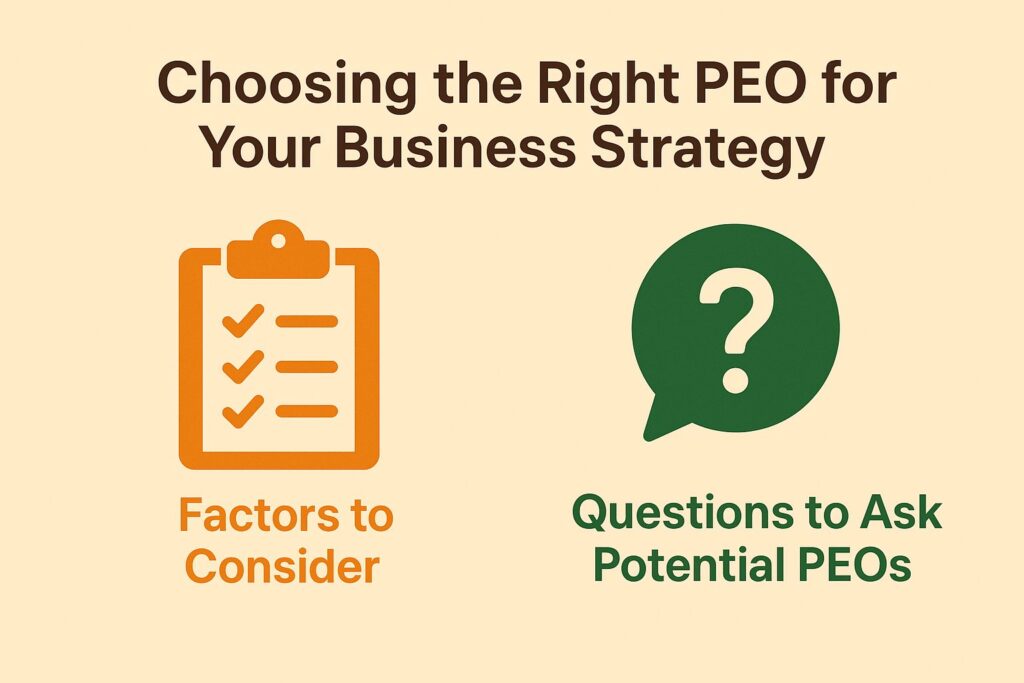
Factors to Consider
Look at things like services, industry knowledge, corporate structure, and costs to select the right PEO.
- Start by evaluating the specific services each PEO provides, such as payroll processing, benefits administration, or compliance support.
- Look for professionals who know your specific issues; for instance, a PEO knowledgeable in healthcare can provide help with compliance.
- Assess pricing structures-some PEOs charge per employee, while others may offer flat fees.
- Request detailed quotes to compare total costs effectively, as these can impact your budget significantly over time.
Questions to Ask Potential PEOs
Asking good questions when assessing options helps you pick a PEO that fits your business needs.
Consider these essential questions:
- How does the PEO follow local, state, and federal rules?
- What technology platforms do they use for payroll and HR management, and how easily can they work together with your existing systems?
Request client testimonials or case studies to assess their service quality, strategic partnerships, and responsiveness. By focusing on these areas, you’ll understand what the PEO can do and how it fits with what your organization needs.
Written by Carol Sanders
Harvard University graduate with a degree in psychology and human resources.
Owner of a PEO consulting firm in Massachusetts and contributing writer for PEO Costs.


